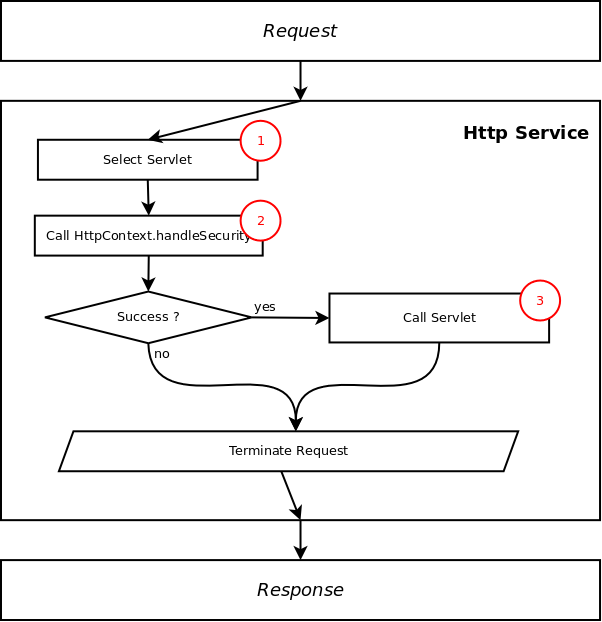Authentication
This section describes the framework provided by Sling to authenticate HTTP requests.
Let's look at generic request processing of Sling: Sling is linked into the outside world by registering the Sling Main Servlet – implemented by the SlingMainServlet class in the Sling Engine bundle – with an OSGi HttpService. This registration is accompanied with an implementation instance of the OSGi HttpContext interface, which defines a method to authenticate requests: handleSecurity.
This method is called by the OSGi HTTP Service implementation after the servlet has been selected to handle the request but before actually calling the servlet's service method.
- First the OSGi HTTP Service implementation is analyzing the request URL to find a match for a servlet or resource registered with the HTTP Service.
- Now the HTTP Service implementation has to call the
handleSecuritymethod of theHttpContextobject with which the servlet or resource has been registered. This method returnstrueif the request should be serviced. If this method returnsfalsethe HTTP Service implementation terminates the request sending back any response which has been prepared by thehandleSecuritymethod. Note, that thehandleSecuritymethod must prepare the failure response sent to the client, the HTTP Service adds nothing here. If thehandleSecuritymethod is successful, it must add two (or three) request attributes described below. - When the
handleSecuritymethod returnstruethe HTTP Service either calls theServlet.servicemethod or sends back the requested resource depending on whether a servlet or a resource has been selected in the first step.
The important thing to note here is, that at the time the handleSecurity method is called, the SlingMainServlet is not yet in control of the request. So any functionality added by the SlingMainServlet, notably the SlingHttpServletRequest and SlingHttpServletResponse objects are not available to the implementation of the handleSecurity method.
The following pages describe the full details of request authentication in Sling in full detail:
- Tasks: Authentication tasks
- Actors: Authentication actors and process
- Framework: Authentication Framework, Auth Core bundle etc.
- AuthenticationHandler: Authentication Handler service API.

